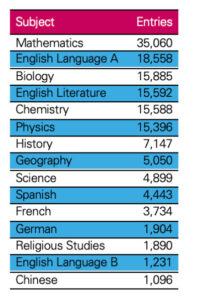examinations
IGCSE


See blog here for analysis of Awarding Organisation GCSE grade distribution analysis.
IGCSEs, or to give them their full title, International General Certificate of Secondary Education, are typically studied by candidates aged 14 to 16 and were originally intended for candidates outside of the United Kingdom. However, as they are broadly like GCSEs, they are a popular alternative for the Home Education community and private candidates in the UK, not bound by the national curriculum delivered in schools.
IGCSEs offer subjects not available at GCSE.
IGCSE qualifications are recognised worldwide.
IGCSEs have two assessment series per academic year (Autumn & Summer) compared to one for GCSE (except for GCSE Mathematics & English Language re-sits in November).
IGCSEs generally place more emphasis on ‘final examinations’ as the primary method of assessment with no coursework or, an option to sit a written paper instead (Particularly appealing where science subjects are concerned i.e. no practicals!)
A select number of Pearson Edexcel International GCSE subjects can be examined on-screen, as opposed to written papers. View here
IGCSEs are offered by just two Awarding Organisations: Pearson Edexcel and Cambridge International. It’s worth drawing your attention to, if you’re not already aware, that these qualifications are named differently by each AO. Cambridge International hold and closely guard the trademark for ‘IGCSE’ thereby preventing Pearson Edexcel abbreviating the qualification title. Hence, Pearson Edexcel are required to refer to them by their full title…International GCSEs, in all communications.
IGCSEs grades are awarded on a scale of 9 to 1, with 9 being the highest grade and 1 being the lowest, by both AOs. However, Cambridge International also have an alternative suite of subject specifications that are still graded on a scale of A*-G to satisfy their international market. Either Cambridge International spec can be studied and assessed in the UK. All assessments are ‘linearised’ i.e. all subject assessment takes place at the end of study and within the same examination series.
Both Cambridge International and Pearson Edexcel each offer two examination series every year: Summer (Apr to Jun) and Autumn (Oct to Nov). Subtle difference here too! Pearson Edexcel follow the academic year (Sep to Aug) whilst Cambridge International’s year is calendar based. Regardless, the Autumn series offered by both AOs have fewer subject options than the Summer series so do bear that in mind when considering subject/examination options.
As with GCSEs some IGCSE subjects are ‘tiered’, dependent upon the Awarding Organisation. Cambridge International offer ‘tiered’ specifications for Mathematics and Science subjects, using ‘Core’ and ‘Extended’ descriptors instead of ‘Foundation’ and ‘Higher’ descriptors used for GCSEs. For Mathematics the maximum grade attainable for ‘Core’ is Grade 5 or C, depending on specification grading scale, whereas the minimum grade attainable at ‘Extended’ level is Grade 3 or E. Please note that for all Cambridge International IGCSE Science specifications, the minimum grade available for ‘Extended’ level is Grade 1 or G.
Unlike Cambridge International, Pearson Edexcel have only one specification that is tiered, Mathematics A (not the Mathematics B Spec!) The maximum grade attainable at ‘Foundation’ level is 5 whereas the minimum grade awarded at ‘Higher’ level is Grade 4, in some instances Grade 3.
Prior to making your examination entry, you will need to determine which level is most appropriate for you.
All IGCSE subject assessments offered by arc exams can be found in our Fees List alongside links accessing relevant AO website areas detailing a wealth of useful information for each specification we offer (Syllabus Content, Support Materials, Past Papers etc)